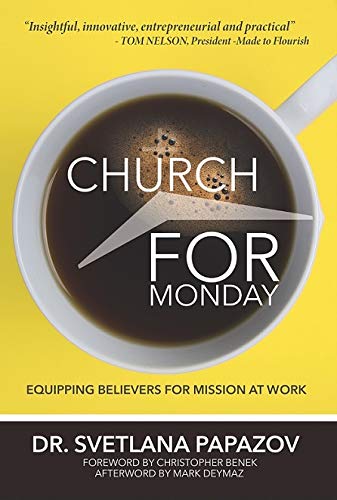 I always enjoy reading books that make me think. Church for Monday: Equipping Believers for Mission at Work by Svetlana Papazov is just such a book ($14.99 for the paperback edition on Amazon). Don’t expect an easy read. Don’t expect a typical church growth book. Expect to be challenged. Church for Monday is not about incremental change or “tweaking” the way we currently do church. It offers a fresh, outside-the-box, entrepreneurial paradigm for ministry. This book will make you think. It should make you pray, and just perhaps cause you to consider changing how you do church and/or church planting.
I always enjoy reading books that make me think. Church for Monday: Equipping Believers for Mission at Work by Svetlana Papazov is just such a book ($14.99 for the paperback edition on Amazon). Don’t expect an easy read. Don’t expect a typical church growth book. Expect to be challenged. Church for Monday is not about incremental change or “tweaking” the way we currently do church. It offers a fresh, outside-the-box, entrepreneurial paradigm for ministry. This book will make you think. It should make you pray, and just perhaps cause you to consider changing how you do church and/or church planting.
A Unique Perspective
A challenge every person, pastor, and church faces is the inability to see ourselves, our ministry, our church, and American culture, the way someone from another culture sees us. Papazov, a committed Christian, grew up behind the Iron Curtain and immigrated to the United States when the Berlin Wall fell. When she arrived, she brought the “fresh eyes” of a newcomer. She writes, “I had a unique perspective . . . my family . . . belonged to the persecuted church in Bulgaria . . . ready at any time to risk everything for our faith in Jesus Christ . . . how surprised I was to discover my expectations of finding vibrant faith (in a country . . . with a currency inscription ‘In God We Trust’) fell short of the reality.” This unique perspective helps frame and inform Papazov’s vision of Church for Monday.
What Is A Church For Monday?
Papazov emphasizes that a “faithful church” must prepare God’s people to live their entire lives in a God-honoring way. Therefore, she uses “Monday” as a metaphor for the entire working week. She insists, “faith that is separated from the rest of life does not serve any part of life.” Therefore, the model she proposes is intended to help “the church navigate the complexities of our current culture and regain a seat in the public arena.” The Church for Monday model consists of three key elements:
- Gospel Translating: This means translating the gospel so that it is understandable and accessible to a “postmodern, post-Christian, post-truth culture.” She observes that today, “People are skeptical of overarching truth, but if we can engage them in an experiential truth of Jesus’ restorative work in their own social groups . . . work, school, or family that . . . convinces most, and especially the Millennials and Gen Z’s.”
- Whole-life Discipling: She describes it as “. . . not a classroom curriculum . . . but a seamless faith that believers live everywhere they go . . . a holistic faith that affects the work they do, commissioning them to Monday’s mission field deploying both their faith in God and their gifts from God.”
- Embedded in the Economy: This means a church seeks to intentionally help the local economy flourish. “They become revenue-generating and add to the local economy by resourcing the creation of sustainable, tax-generating, charity-giving jobs and businesses; offering jobs as an employer and training for employment.”
According to Papazov, “The church is called to be a living, prophetic, tangible model of the Great Commission by integrating faith, creativity, and mission in the marketplace.”
The Rise of the Co-vocational Pastor
Most of my readers are familiar with the term “bi-vocational pastor.” Typically this refers to a pastor who must work a second job to survive financially. However, Papazov’s book is my first exposure to the term “co-vocational pastor.” She explains, “Their two vocations are aligned within one calling and one life purpose focused on Jesus’ kingdom . . . he or she sees the value of being personally embedded in the economy to interact with and reach the culture outside of a Christian workplace.” Svetlana personally models this approach by working both as a business consultant and a lead pastor.
What Does The Future Hold?
I once read that the only thing we can know for sure about the future is that it will not be like today. Therefore, I make no personal prediction. However, the foreword of Church for Monday by Christopher Benek, pastor of First Miami Presbyterian Church, contains the rather dire forecast of 22% unemployment and the closure of over half of the churches in the United States during the next ten years. Obviously, I hope he is wrong. However, Papazov’s personal vision of the future church is far more hopeful. She believes . . .
The future church will be gospel-translating, experience-based, and Spirit-evident, with small congregations that grow from conversions, not church transfers. Its clergy will likely be co-vocational and willing to equip believers for their lives on Monday. It will be embedded in the marketplace, dually-using their facilities for the flourishing of the community and for their own sustainability.
Much More In The Book
Church For Monday has far-ranging discussions of culture as well as a variety of philosophical issues and practical concerns. Svetlana Papazov shares her personal experiences in launching Real Life Church and the Real Life Center for Entrepreneurial Leadership Excellence, but there are numerous other stories and ministry testimonies from all over the United States. I recommend the book as a thoughtful and challenging read with special relevance for church ministry and church planting in economically-challenging circumstances whether rural or urban.
